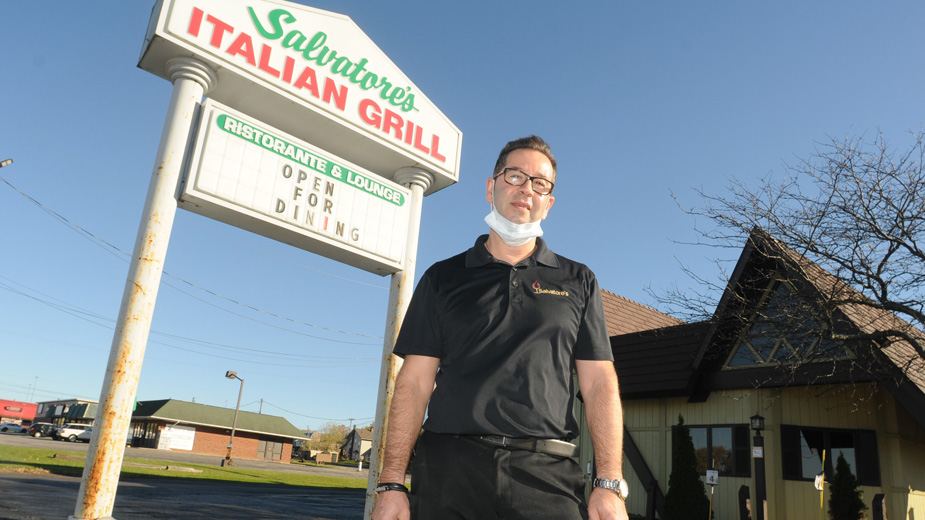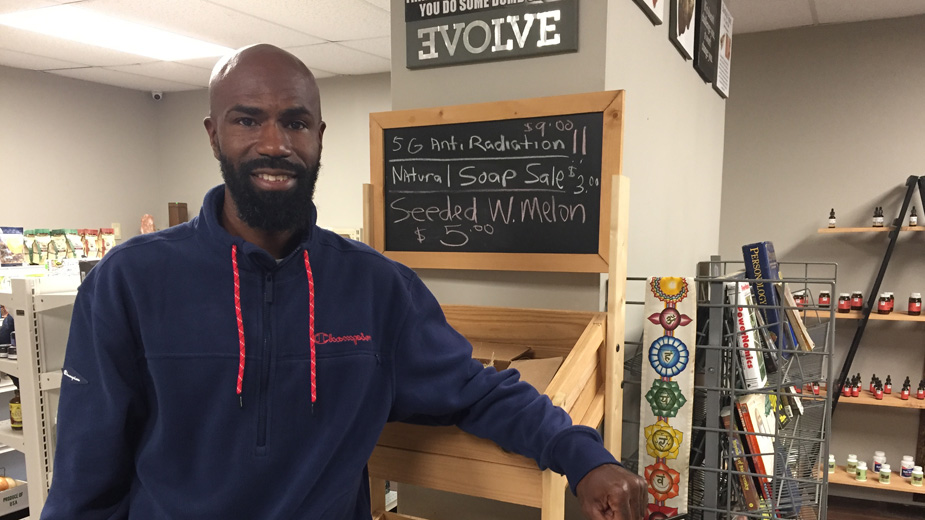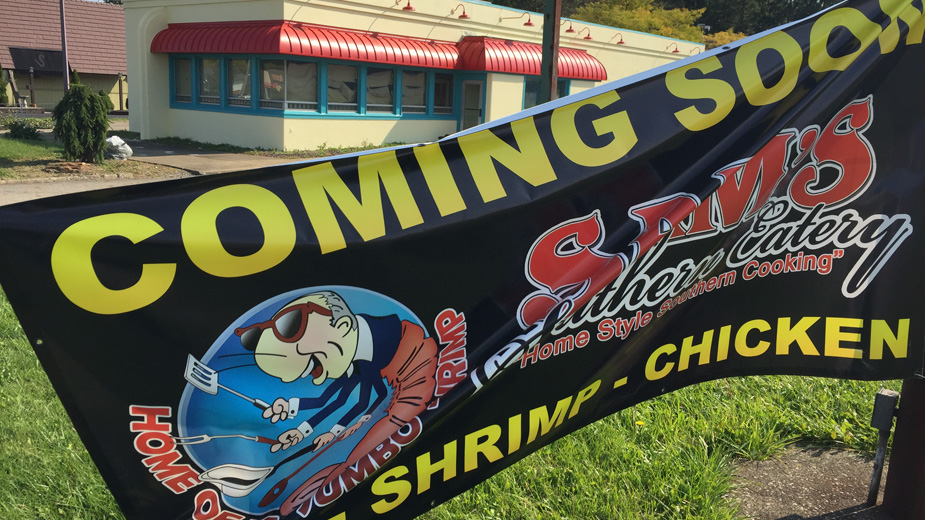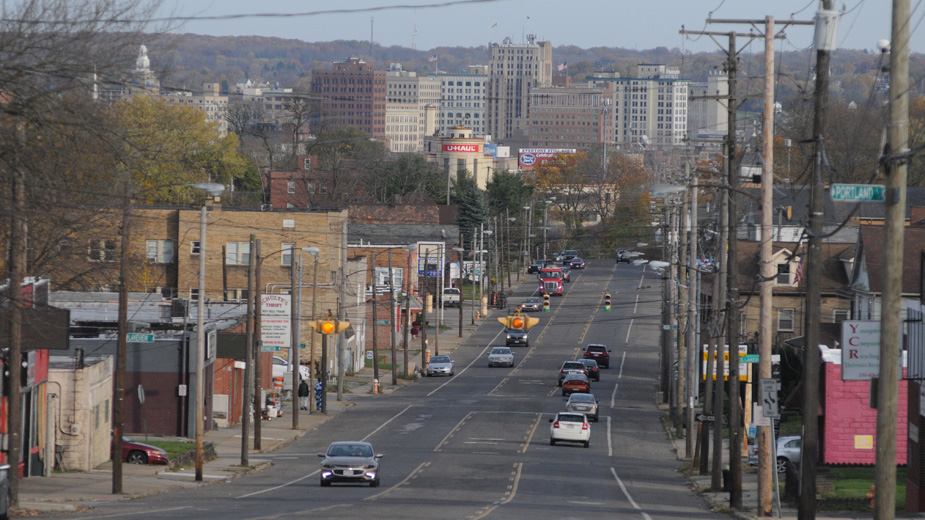YOUNGSTOWN, Ohio – Michele Carannante is preparing for the worst but is optimistic his business will come out stronger once this second surge of the pandemic passes.
The restaurant he owns, Salvatore’s Italian Grill at 4831 Mahoning Ave. in Austintown, is especially vulnerable since the state of Ohio’s social distancing guidelines, along with capacity restrictions on dine-in establishments, has already affected his business substantially. With the cold weather setting in, patrons won’t have the option of dining outside, leaving the restaurant to rely on take-out meals and limited indoor service.
“Right now, we’re surviving,” Carannante says. However, the recent spike in COVID-19 cases across the state is cause for concern since customers may be more reluctant now to venture out for a meal. “People start to lack confidence and think it’s too risky to go inside and eat,” he says. “They’re in a state of confusion. There could be long-term consequences.”

Still, small businesses along a 10-mile stretch of Mahoning Avenue are trying to weather the pandemic in stride. The corridor, a major commercial thoroughfare, extends westward in a challenged urban economy in Youngstown, then transitions to a suburban landscape filled with strip plazas, fast-food chains and service establishments in Austintown Township. In between is a mixture of retail, light manufacturing and professional offices that cram the northern and southern sides of the street, presenting a microcosm of the local economy in this lingering public health crisis.
Activity and traffic are brisk on a bright afternoon in November when it appears that a good number of those businesses ordered shut down during March through May have reopened, although several empty storefronts and vacant buildings along the corridor stand as examples of the casualties. Some of those businesses that have reopened are making ends meet while others are thriving and have even carved out new opportunities brought on by the pandemic.
“It was a scary time for us,” Salvatore’s Carannante says of the lockdown. “That was the worst two months we ever had in this business.”
The restaurant received some relief through the Paycheck Protection Program – a federal program that provided potentially forgivable loans to eligible businesses – but those funds were used for bare essentials such as paying the rent, Carannante says.
Salvatore’s has been in business for 20 years. Carannante says he’s confident the restaurant will be around for another 20. “We’ve got to be optimistic,” he says. “Christmas will certainly be different this year than last year. We go day-to-day.”
Clearly restaurants, taverns, travel services and bricks-and-mortar retail businesses are among the most affected by the downturn caused by the pandemic. According to the Yelp Economic Impact Report published in September, 61% of all restaurants across the county that were closed in March have shut down permanently while 58% of shopping and retail establishments failed to reopen.
Meanwhile, those in the home improvement, real estate, automotive repair, health care and general services sectors have maintained a low rate of closings, the report shows.
Along Mahoning Avenue, a Denny’s restaurant remains shuttered in Austintown – a note on the door says the establishment will remain closed as the business transitions to new ownership. In Youngstown, a hot dog shop – The Doghouse – closed and has not reopened while long-time plumbing wholesaler C&V Plumbing shut its doors, although it is unclear whether that shutdown is pandemic related.
Other sections along Mahoning Avenue in Youngstown are pocked with storefronts that have been empty for some time, while local restaurants struggle to get by.
“The restaurants and bars have been definitely impacted,” says Fourth Ward Councilman Mike Ray, who represents the city’s west side and whose ward includes Mahoning Avenue. “Other retail and service businesses are doing OK.”
If anything, Ray says, the pandemic has forced small businesses in his ward to become more efficient, fleet footed and adaptable to unpredictable business conditions. “Small-business owners are some of the most creative folks out there,” he says. “They’ll do anything to adapt. And we encourage everyone to support local businesses during this pandemic.”
Indeed, some along this section of Mahoning Avenue have staked out opportunity.
“We’ve been open about three or four months,” says Gerald Walker, manager at Evolve Market, billed as an “organic convenience store” at 2840 Mahoning Ave. “It’s all about bringing healthy foods into the community.”

Walker says with emphasis that there is no establishment in the city that sells organic and all-natural products. And grocery stores are scarce. “We’re not waiting for someone to come save us. We have to save ourselves with a store like this,” he says.
The small shop sells products such as tinctures, herbs, sea moss, organic coffees and teas, safflower oil, all-natural soaps, supplements and other health products, Walker says.
“These are all-natural products without any preservatives,” he continues. “We’re doing pretty good – enough to survive. But we’re a startup. Ideally, we’d like a bigger place, but we’ll make it work for now.”
Light industrial and wholesale businesses have also borne the brunt of the pandemic.
“We’re starting to pick back up. But it’s been a hard grind,” says Mike Foley, shop manager at Baker Plastics Inc., at 900 Mahoning Ave. in Youngstown. The company custom fabricates and distributes a range of plastic products such as museum and hobby cases, food displays, store fixtures and countertops. “Things were really dismal in the beginning,” he says.
Foley recalls when this section of Mahoning Avenue – just across the Mahoning River and west of the central business district – resembled a “ghost town” when the lockdowns first took place. “I didn’t realize it would only take a couple months to affect us the way it did. We were doing really good last year.”
Baker Plastics, a family-owned business since 1946, was forced very quickly to do more with less. “I’m the only one here now,” he says, noting before the pandemic hit, two others were employed at the shop.
The pandemic also served as a wake up call in the event of another shutdown. “It got our attention to make sure we’re stockpiled enough in case this happens again,” Foley says.
As you move west into Austintown, there’s little evidence of widespread shutdowns. In some cases, properties that have remained vacant for years are now showing signs of new life.
For example, a banner stretched in front of a vacant Antone’s Kitchen restaurant advertises a new fast-food chain coming soon: Sam’s Southern Eatery.

“It’s been active for us,” Adam Divelbiss, a sales agent at Platz Realty Group, says of the Mahoning Avenue corridor. “We have a couple of things going on along Mahoning,” he says, declining to be specific.
The pandemic, Divelbiss says, has not necessarily squelched potential deals – just slowed them down. “No one’s shut the faucet off.”
Meanwhile, service-oriented businesses are adapting to changes because of a sizeable increase in orders brought on as a result of the pandemic.
“We’ve been busy all through this,” says Dorothy Bukovi, owner of Aadams Appliance Services Inc. at 4160 Mahoning Ave. “Business has gone up at least 50%,” she says as she gestures toward a desk covered with service orders for dishwashers, refrigerators, ovens, washers and dryers.
She attributes the spike in business to more people dining at home and the lack of inventory of new appliances at some of the major retailers. Moreover, federal stimulus money and additional unemployment benefits distributed to individuals and families during the second quarter gave households the extra money to spend on appliance repairs. “Orders really started to tick up, mostly for laundry and refrigeration,” she says. “We’ve had to hire a few technicians.”
As winter approaches, Buvoki expects more service calls for stoves and ovens because cooking will move indoors and it’s likely that fewer patrons will visit restaurants, especially if COVID-19 cases continue to climb.
“The pandemic impacted us slightly,” says Diane Jones, owner of Jones & Associates Embroidery, a screen-printing, embroidery and vinyl sign services company at 5015 Mahoning Ave. in Austintown. “Everyone was shut down in March and April. So we regrouped and started new web stores that we didn’t have.”
Jones & Associates prints and embroiders apparel for local high schools and Youngstown State University. Once the shutdown was lifted, the business began to prepare for the high school football season. There was one complication: those sports that were postponed as a result of the pandemic such as Little League baseball, started just as the business was ratcheting up for football. “All of the other sports opened up at the same time – baseball, soccer, softball,” Jones says.
That meant an overwhelming volume of work to complete in a short period of time, she explains. Simultaneously, the business has to contend with walk-in retail traffic, which she says is also robust. “We’ve had to cut back our retail Saturday hours because we couldn’t keep up with the orders,” she says. “It’s a good position to be in.”
The company did take a hit after YSU pushed its football season to the spring. But other avenues of business have helped to offset any lost revenue from that account.
“We do a ton of masks,” Jones says.
In Ohio, all who enter public buildings are required by state mandate to wear face coverings to mitigate the spread of COVID-19. As such, Jones says her company has come up with some creative designs for schools, organizations, and clubs that have them printed directly on customized masks. “We have them for just about every school and the kids love them,” she says. “Even youth sizes.”
They’ve become so popular that the company devotes a separate website to face coverings, Jones says, a line that was unimagined a year ago.
“Who knew that a mask would be the big accessory for 2020?”
Pictured: Small businesses along Mahoning Avenue tough out the economic downturn from the pandemic.
